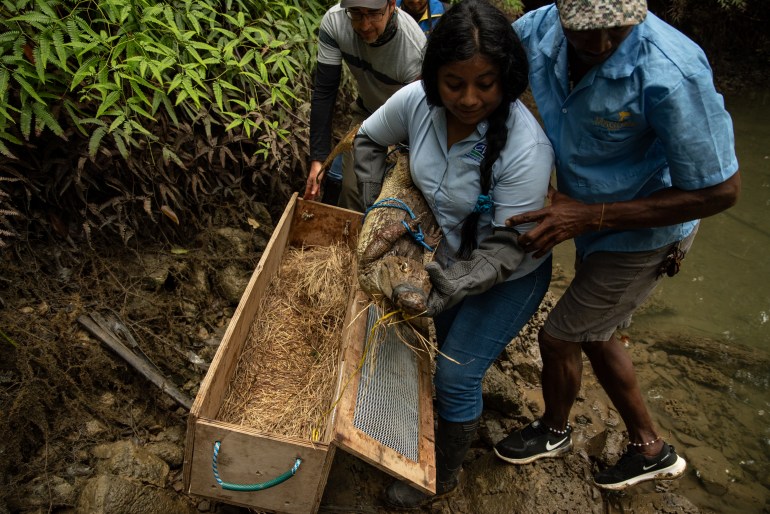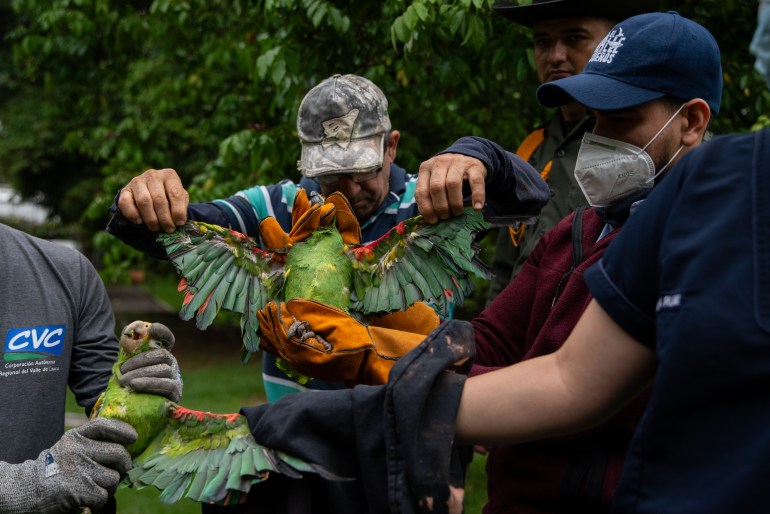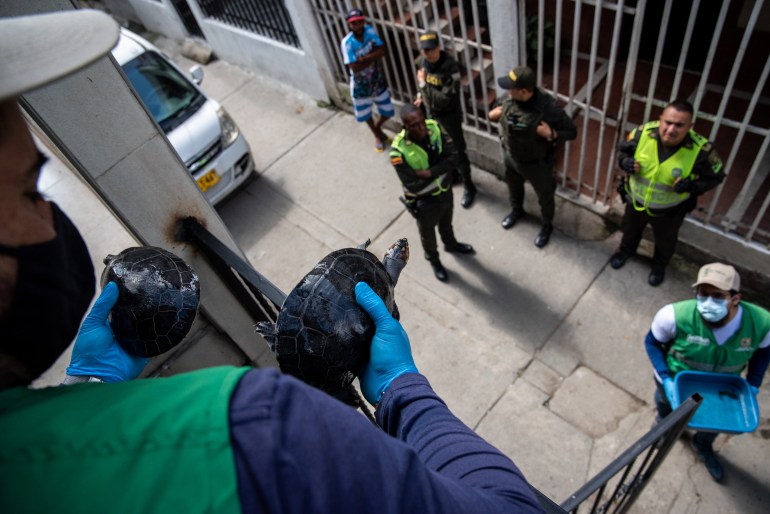Continuing to search, officers also uncovered two taricaya turtles– a species native to the Amazon’s freshwater tributaries, categorised as “vulnerable” by conservationists – hidden in a concrete patio.
The rescue of the stolen fauna was the result of an undercover sting operation led by a budding investigative unit that targets wildlife trafficking – not drug trafficking – in Colombia.
While Colombian law enforcement continues to devote much of its resources to combating drug traffickers, the government four years ago decided to also crack down on poaching wildlife trafficking, a lucrative business that globally generates $23bn in revenues annually.
One of the most biodiverse countries in the world, Colombia is increasingly vulnerable to illicit wildlife trafficking; in 2023, the wildlife investigative unit rescued three trafficked animals every 20 minutes on average, or 28,025 in total.
“Because of the country’s context, the police used to focus on armed groups, rebels, drug trafficking, and so on, instead of environmental issues,” Cristian Mesa, the head of Colombia’s police unit investigating environmental crimes, told Al Jazeera. “That’s changing.”
Featuring two oceans, the Andes mountains and segments of the vast Amazon, Colombia and its myriad microclimates are home to more than 67,000 species of fauna and flora. And from those tropical rainforests, pristine coastlines, and soaring mountains, traffickers pluck scores of wild animals to sell on the black market, endangering rare ecosystems, and the survival of species found nowhere else in the world.

“If you remove enough individuals of an endemic species, you’re going to extinguish it entirely,” said Silvia Vejarano, a biologist with the World Wildlife Fund, a Swiss-based conservation non-profit. “But if it’s not an endemic species, it still fulfils an important role in the ecosystem, either by dispersing seeds, pollinizing, or hunting other species that, if are not controlled, are going to extremely alter the ecosystem.”
Status symbols, with scales
In recent years, as Colombia has expanded efforts to protect its natural wealth, the South American country has trained roughly 100 officers to investigate wildlife trafficking and ramped up its operations, both in size and scope. Mesa said that police were led to create the specialised unit partly as a response to both the growth in the underground wildlife trade and the increasing sophistication of the traffickers who have organised to cash in on the booming demand for exotic pets that took off during the coronavirus pandemic. Last year, the unit dismantled 34 criminal organisations trafficking animals illegally.
“In the past, we had very few personnel trained and qualified to investigate wildlife trafficking. So when we saw these shortcomings and the [impacts] that trafficking was causing, we decided to strengthen the investigative group,” Mesa told Al Jazeera.
Poachers and wildlife merchants often transport fauna from remote areas to cities, using the same routes employed by drug traffickers while attracting significantly less attention from law enforcement, Mesa said. Wildlife traffickers often store animals in packages used by domestic shipping services, or in suitcases carried through airports to customers as far away as Europe and Asia.
Once conducted openly on intercity roads and at food markets, wildlife trafficking has gone underground since the pandemic, with macaws and monkeys now advertised online in Facebook groups, WhatsApp chats, and Instagram pages. In many cases of trafficking, a sale starts with the click of a mouse.
Catalina Ocampo-Carvajal, a biologist and the founder of a Twitter account that curates citizen reports of wildlife trafficking, said she’s seen all kinds of exotic animals sold online, from rare harlequin poison frogs to multicoloured macaws to the critically endangered cotton-top tamarins.
“People continue to buy exotic animals … because they signal status for people. So people believe that owning non-domestic animals gives them a little more popularity among their friends and social networks,” she told Al Jazeera.

Catching poachers with same tactics used to catch dealers
Other experts pointed out that owning wildlife such as parrots or macaws remains a cultural tradition in some parts of Colombia and buyers may not even be aware that it’s illegal.
Unsurprisingly, the tactics used by police to catch poachers mirror drug buys used by police to catch dealers. Two police investigators are assigned to monitor these illicit transactions, poring over social media sites for evidence. But after the pages are reported and deleted, new ones take their place, Mesa said. Meta, the company that owns Facebook, Instagram, and WhatsApp, did not respond to requests for comment about efforts to prevent illegal wildlife trafficking on its websites.
Along with scouring social media accounts, police also go undercover, borrowing tactics used by police to arrest narco-traffickers. After identifying a trafficker attempting to sell the three-metre (10-foot) python online last year, an undercover agent posing as a buyer arranged to meet with him, made a downpayment, and scheduled a date to pick up the snake at the seller’s home. On January 20 of last year, a team of police and environmental authorities arrived at the trafficker’s doorstep, rescuing the python and two turtles they stumbled onto as a result of the search.
Colombian lawmakers in 2021 made wildlife trafficking a crime that carries a punishment of between five and 11.25 years in prison. The investigative unit has allowed Colombia to make high-profile arrests that would not have been possible in the past, such as that of Nancy Gonzalez, a fashion designer who used the skins of trafficked animals to manufacture luxury bags and was extradited to the United States last year on wildlife trafficking charges.
But defendants seldom serve more than a few days in jail, Mesa said. The man arrested for attempting to sell the python, for instance, was released pending trial.
Moreover, trafficked animals don’t fare well. Between 50 and 80 percent die in transit as a result of harsh conditions, Mesa said. But the pair of turtles and python rescued by authorities survived the ordeal.
A zoo in the warm-weathered Tolima province adopted the rescued yellow-scaled python, a species native to Africa, Asia, and Oceania. The snake will likely live the rest of its life in captivity, according to Andres Posada, a biologist who works with Cali’s environmental authority.
The pair of taricaya turtles, on the other hand, were released back into a provincial waterway, representing a modest victory for a species that is at possible risk of extinction.
Such outcomes are uncommon in this line of work, experts said, but they keep Mesa, the police investigator, going. “Every animal has a role in nature, so you feel a sense of satisfaction knowing you’re not just helping out an animal, but really benefiting [the entire world],” he said.

